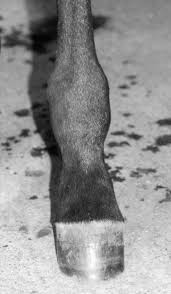Physitis in Foals
What is Physitis?
Involves swelling around the growth plates of certain long bones in young horses. . Physitis is inflammation of the growth plates in the long bones of growing foals (physis = growth plate, itis = inflammation).
In utero, the skeleton of a foal is composed of cartilage. This cartilage gradually turns to bone as the fetus matures (a process called endochondral ossification). When the foal is born, majority of his bones have ossified (turned to bone), leaving cartilage at the site of the growth plate to allow further growth in length while the bony matrix provides support to the weight- bearing foal
The growth plates on each bone close (or ossify) at different times, and are all closed by about 1.5 years of age. It is during this in between stage just prior to closure, that physitis can arise at the growth plate.
Causes
- calcium phosphorus ratio imbalanced
- malnutrition in utero. Mare nutrition is fundamental to good bone formation in foals.
- conformational defects that lead to asymmetrical weight loadings.
- excessive exercise before bones are fully formed
- seen frequently in well-grown, fast-growing, heavy-topped foals during the summer when the ground is dry and hard, and on stud farms
- Excessive loading (through obesity and in some cases fine bones foals with a large body) or weakened bone and/or cartilage, or a combination of these factors.
Clinical Signs
It is characterized by flaring at the level of the growth plate, giving a typical “boxy” appearance to the affected joints.
Treatment
during the acute stage a vet must be called.
- Reducing food intake to reduce body weight or at least growth rate;
- Confining exercise to a yard or a large, well-ventilated loose box with a soft surface (eg, peat moss, deep straw, shavings, or sand);
- Reduce all concentrates grains and high protein feeds like soy products and lucerne. These are better fed to the lactating mare for a short period while the milk supplies all the nutrients required in the correct balance.
- Ensure that the feet are carefully and frequently trimmed.
- Bran should not be fed s this alters the calcium phosphorous ratios.
- The calcium:phosphorus ratio should be adjusted to 1.6:1,
- Limit protein content to <10% of dry matter.
- Add dicalcium phosphate or bone flour (10–30 g daily) should be added to the diet. Powdered egg shells soaked in lemon juice will provide calcium citrate as an alternative.
- Ensure your foal gets sunlight so that there is sufficient vitamin D production along with calcium supplementation.
- Address any inflammation caused by physitis prior to closure of the plate using a veterinary anti-inflammatory or if not acute then, something more natural like devil’s claw, white will bark etc.
- Restore integrity of the bone and cartilage area by providing additional vitamin C which will improve collagen production which is a prescursor to cartilage production. Hira Mobility Tonic has additional vitamin C, blood circulatory herbs and herbal anti inflammatories like devil’s claw and white willow bark.
- Provide Omega oils which will help with the prostaglandin inflammatory response by balancing the proinflammatory P3 against the anti-inflammatory P1 and 2
- Providing a circulatory herb like ginkgo will improve blood supply to the rapidly growing area which will improve cartilage to bone formation

